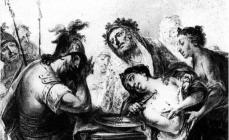Training at the Faculty of International Journalism MGIMO. Let's see:
1. Languages
Here they have repeatedly wrote that MGIMO does focus on languages. It's like that. And this is an absolute lottery - the language cannot be chosen. More concerns the Faculty of MO, there is a stricter there. But everything is like that. Here are more often given European languages, but once every five years and Serbo-Croatian, and Chinese. Ten times think if you want to spend everything free time And the nerves on endless translations (usually political themes). A huge plus, however, is that if you still love your tongue and work a lot on it, you will find a lot of opportunities. From foreign internships to part-time. Almost all of my part-timeings at the university were somehow related to the language.
2. Training specialty
Well, it is meaningless to comment on something. On the journalist you will not be learned here. However, I'm not at all sure that there are universities in Russia who are able to cope with this task. The programs are obsolete too quickly. Now people practically do not read newspapers - only Internet portals, agree? And on MZ MGIMO just a bunch of objects dedicated to newspaper journalism, and this is the main love of the head of the profile department. He will have several semesters to broadcast you about Soviet newspapers and demand that you know their circulation. But why? ....... Why write newspaper reports on pairs? Learn to disperse a newspaper?
In fairness, the pair of useful and interesting items really was. Couple. Not more.
Secondly, journalism is a practice. At the faculty you will not receive it. There is a master class of a journalist who often lead people either at all who have not worked in journalism, or have long been departed from the profession.
All professional journalists, to which I came to the internship, said that for a career in journalism, you need to go and work. And here we are faced with the following item.
3. Work
In MGIMO, it is almost impossible to combine study with full-fledged work. First, very large training loads. Secondly, quite strictly followed attendance, which affects the assessments. There is exceptions, but they are rare.
4. Contingent
The problem is ROGOFA as phenomena rather than MGIMO - a very uneven gender. There are few boys, and they are trying to encourage them every way so that they somehow diluted the Babye Kingdom. When there are some girls in the team, there are often disassembly on scratch. Plus, a lot of ambitious olympiaders who are willing to kill you, in order to answer the first to answer the seminar. But here everything is very dependent on the group.
But in MGIMO, contrary to stereotypes, there is practically no problem of social bundle - and the Olympics from the Ryazan region and the Golden Youth with Rublevsky highway coexist peacefully. Teachers look at the knowledge on the subject, and at seminars are all equal. But still there is a problem with those who are cooled and a pelisher - and this is not bribes. I never heard about bribes on credits or exams. However, it is almost always possible to write off. Some classmates for each exam came with some super-modern imperceptible headphones in which they were dictated by tickets. Another gold youth very often buys analytical references and courses. And at that moment, when you bring your honestly written coursework, and the chicken on the studs proudly puts alongside "his" beautifully twisted work, and you know that she did not move with her finger naminicure to at least do something Worker-peasant uprising :)
5. Prospects for employment
They are, no wonder Mgimo leads in the lists of graduates' employment lists. Those who want to go to the Foreign Ministry can try their happiness in the Foreign Ministry (especially take boys. Very often there is a job related to your foreign language. Several classmates work directly in the specialty - precisely with international political news. Someone goes to the magistracy (by the way, do not go to the MZ magistracy, language pairs there are less than on undergraduate, and meaningless items more).
Output:
In general, looking at the state russian education and on russian journalism In general, probably, MZ MGIMO is not such a bad place to obtain a bachelor's diploma. It sounds prestigious, the language knows, in politics and international relations, superficially (and the journalist is no longer necessary) dismantled. You can go to the Foreign Ministry, TASS, or RT.
But if you are looking for cheerful parties and excellent memories of student years if you want to go to journalism from love for literature and creativity, if you do not want to translate texts about party systems, and you want to write / shoot about people, fashion, science, then not Rubet your youth :) Especially concerns the platforms. Training at MZ MGIMO this year is half a million. For such money, it is quite possible to get a good education in the field of any Digital journalism in the West.
|
|
Information about universities
The history of MGIMO
Moscow state Institute International relations, founded in 1944, is considered the oldest center where international experts were trained. The decision of the Sovnarkom (October 14, 1944) was decided to create this educational institution From the International Faculty of Moscow State University. After opening, only three faculties existed in MGIMO: economic, international and legal. In the first set, there were only 200 students, but since 1946 began to send applicants from foreign countries to their studies.
In 1954, there was a connection with MIV (Moscow Institute of Oriental Studies). As a result, the Eastern branch and a unique Lazarevian library appeared at the university, which was famous for its assembly of oriental literature. In 1958, the MGIMO entered the Institute of Foreign Trade (created in 1934). Thanks to this circumstance, the preparation of specialists of foreign economic activity was significantly increased, and an extension of the economic faculty occurred. In 1969, the Institute was solemnly opened by the Faculty of International Journalism and the International Law Faculty, and in 1991 - the Faculty of International Business and Business Administration.
In 1994, the Moscow State Institute of International Relations is deservedly assigned to the University's status. In 1998, the Faculty of Political Science opens. In 2000, for better training of specialists in international cooperationThe University is formed by the International Institute for Energy Policy and Diplomacy. In 2011, there is a transformation of the Institute of Foreign Economic Relations in the Faculty of Applied Economics and Commerce.
Learning in MGIMO today
Today, this higher education institution is considered one of the leading professional humanitarian universities of Russia, where the training of international specialists is being prepared. The university's teaching staff includes more than a thousand professors, 20 academics, 150 doctors of sciences, more than 300 candidates of science and associate professors. For applicants, it is possible to choose one of the faculties:
- Faculty of international relations;
- International Institute of Energy Policy and Diplomacy;
- Faculty of political science;
- International Institute of Management;
- Institute of European Law;
- European educational institute;
- Faculty of International Journalism;
- Faculty of basic training;
- Institute of International Relations and Management;
- Institute Additional vocational education;
- International Law Faculty;
- Applied economy and commerce;
The institute presents the following forms of training: part-time (evening), full-time and correspondence forms of training. A transition to a new, multi-level education system has already happened to MGIMO, which consists of 4-year preparations for the selected bachelor specialties. After the undergraduate, it is possible to continue its training in the magistracy, to obtain the required degree of master. The training of masters in the university began to exercise since 1994, today there are 48 special master programs in 13 directions. Also, after receiving a diploma of higher education, a student, if desired, may be trained in graduate school and doctoral studies, and in graduate school, the high-quality training of scientific personnel in 28 specialties is being taken, will be accepted on a competitive basis, if any higher education Or any achievements in scientific work.
Additional opportunities MGIMO for students
For visitors, applicants are provided with a hostel. The university has four hostels having all the convenience necessary for accommodation. For settlement, apply the appropriate application upon delivery of documents (in Reception Commission), accommodation occurs after payment for accommodation. An annual competitions for scholarships are held in MGIMO, in addition, students have the opportunity to receive various nominal scholarships, and the teachers provide for the receipt of the Grande.
In MGIMO working military Departmentwhere hundreds of officers (military translators) were prepared in the specialty. This department was formed in 1944, the qualified specialists were performed successfully fulfill the tasks during the period of the deadlines. For those who want to become the owner of the second higher education, the university offers special programs to obtain the necessary knowledge. Today, more and more often for career growth requires a diploma, so the university provides an opportunity to receive a second higher education at the most sought-after areas - economic and legal.
There is also an opportunity to receive vocational education for persons already having a diploma of higher education. Training is conducted at the Institute of Additional Vocational Education, in addition, in the European Tutorial Institute, courses on advanced training on the economy, the right and policy of the European Union are held. Upon completion of learning, students are issued a certificate (or evidence) of the state sample.
The structure of the university has 5 institutes, 8 faculties, there is also a business school and international CompetenceIntensive training takes place on 20 language departments of 54 foreign languages. In 2013, this educational institution successfully passed the international accreditation of all available educational programs.
The rector of the university is academician, Doctor of Science, Professor Torkunov Anatoly Vasilyevich, performing data since 1992. In Rating BRICS, MGIMO is among the top five universities in Russia. During the study, criteria were taken into account: academic reputation, reviews and reputation among employers, the presence of a scientist in the teaching staff, the number of foreign students, etc.
The Moscow State Institute of International Relations made a significant contribution to the intensive development of science of country studies, international law and relationships were issued many textbooks and scientific work. At the same time, MGIMO supports partnerships with many educational institutions CIS and abroad. Thanks to this, the specialists produced by this university are always in demand and employment does not cause complications.
There are many decent higher educational institutions in Russia. One of the most elite and prestigious is MGIMO. This is the name of the institute existing in the capital of our country several decades, he produces highly qualified international specialists from its walls and diplomat practitioners.
First page in the history of the university
More than 70 years there is a MGIMO. His story began in 1943 with the formation of the International Faculty in the structure of the Moscow State University. This division shortly functioned in the named educational institution - only 1 year. In 1944, the Faculty stood out from the MSU and increased in an independent educational institution - to the Institute of International Relations (MGIMO Foreign Ministry of Russia).
While working as part of the spirit of the head university. This allowed the division to further set the right direction for the development of MGIMO. In the first year of work, only 200 people were adopted in the university. In subsequent years, this figure has increased. Foreign citizens began to appear among students.
Modern advantages
If you compare the start of activity and today's days, it can be concluded - MGIMO Foreign Ministry of Russia has passed the thorny path of its development. Now in the structure of the university 8 faculties, 5 institutes, 80 departments. More than 1,200 professors and teachers are involved in the educational process - this is an exceptional team of specialists.
Recently, MGIMO set himself a crucial professional task - to develop educational programs of the new generation. Previously, the university did not have the right to this, because there were general standards for all educational institutions. However, the President of Russia, taking into account the authority and prestige of MGIMO, signed a decree on the provision of the right to develop its own educational programs.

Education and science
In modern universities, education is closely intertwined with science. This feature acts as a status sign of universities. In the Moscow State Institute of International Relations of the Foreign Ministry of Russia, the principle of combining science and education is implemented in several forms:
- Leading Russian international scientists are involved in the training of students in the university. Thanks to them educational process It becomes better, saturated useful and relevant information.
- In MGIMO from representatives of academic and university science, analytical structures state power Teams for working on joint textbooks are formed.
- The Moscow State regularly organizes scientific and practical conferences, seminars and participates in them.

Anatoly Vasilyevich Torkunov, holding the position of Rector MGIMO, states that today the university is not only a unique humanitarian international center, but also the authoritative scientific center. The results of some studies are introduced into educational activities. For example, thanks to the previously conducted work, the following results were achieved:
- a training course (Speccars) appeared on international legal regulation of information and communication technologies;
- modernized master's discipline "Innovative processes in education" (direction - "Pedagogical education") and so on.

Direction directions
The license existing in MGIMO is indicated that the university at the undergraduate steps has the right to conduct educational activities in 25 directions. Among them, "international relations", "journalism", "economy", "jurisprudence", "political science", "state and municipal Governance"And others. The university has a branch in the city of Odintsovo in the Moscow region, but the directions on the undergraduate are offered less.
An important feature of the Odintsovsky branch of MGIMO is the presence in its structure of the Gorchakovsky lyceum. This educational institution implements the main general educational program of secondary general education with a socio-humanitarian bias. Classes are formed small, up to 15 people. Pupils, except for general education items, are read by the disciplines of an international profile to expand the horizons and understanding that they are waiting for them in MGIMO after admission.

Study of foreign languages
Back in the first days of its existence, the Institute paid special attention to the study of foreign languages. Currently, according to the rector of the university Anatoly Vasilyevich Torkunov, MGIMO continues to adhere to this tactics. Foreign languages \u200b\u200bare important working instruments, thanks to which students, becoming diplomats, solve professional tasks.
The curriculum on each specialty in MGIMO includes the study of two foreign languages. One of them is, naturally, English. By virtue of the established geopolitical realities is considered very important. People who successfully study the first and second foreign languages \u200b\u200bcan optionally sign up for an additional language. To date, such students numbered in MGIMO more than 500.
When learning foreign languages, modern educational technologies. There are more than 50 multimedia classes in the university, in which teachers and students can use special computer programs, video and audio recordings. Every year, televisms installed between MGIMO and foreign universities are becoming increasingly significant.

Graduate demand
MGIMO is an abbreviation, which is known not only in Russia, but also beyond. The name of the university has long become a symbol of high-quality education. Graduates of the institute are considered special casch. A MGIMO diploma testifies to the presence of brilliant education and is a kind of quality mark.
Graduates of the Moscow State Institute of International Relations are very in demand, as evidenced by concluded cooperation agreements with various state structures, commercial organizations, companies. Communications established with the Ministry of Economic Development, the Federation Council, the Departments of the Government of Moscow, Rosgosstrach, Uralsib, etc. In the listed structures and organizations, students are working for themselves.

Famous graduates MGIMO
The fact that Mgimo University is a prestigious university, is not a fiction. This is confirmed by the success of many graduates. Among the famous personalities with a diploma MGIMO can be noted Sergey Viktorovich Lavrov. Today he holds the post of Minister of Foreign Affairs of Russia, is famous person Abroad. He talks about MGIMO not only as a native Alma Mater, but also as a modern educational institution of the highest category.
The list of famous graduates contains Ksenia Anatolyevna Sobchak. She, being a MGIMO student, in 2002 received a bachelor's degree in international relations, and in 2004 he became a master after the end of the Faculty of Political Science. For the presence of such serious education in Ksenia Sobchak, many people were not even suspected, because she after graduating from the university took part in creative and commercial projects. She took up politics relatively recently - from the moment of nomination of his candidacy for presidential elections.
Completeness of receipt: competition and passing score in MGIMO

The Moscow State Institute of International Relations seek to enter applicants not only by the Moscow region, but also other regions of Russia. Interest causes a university and in foreign citizens. However, everyone to study in such a prestigious educational institution should be remembered that the competition among applicants is very high here. In 2017 on 1 budget place 32 people claimed, and 1 paid place - 13 people. The passing point as a whole is high in the university. In 2017, the average on the budget was equal to 95 points, and on a contractual form of training - 79 points.
MGIMO is the university for admission to which it is worth coming. Here is a brilliant education that meets international educational and scientific standards. The diploma of this school opens the road to the most famous and elite organizations of our country.
MGIMO - one of the leading russian universitiespretending specialists in international relations, political science, economics, rights, management, journalism, etc.
Video Film About University:
The date of creation of MGIMO is considered to be 14 October 1944, when, on the initiative of the People's Commissars of the USSR, the Council of People's Commissars of the USSR, on the initiative of the People's Commissioner of the USSR, was transformed by the year earlier international Faculty Moscow State University in a separate institution.
Created as a forge of diplomatic personnel, in the New Millennium University entered as a unique humanitarian international university, a reputable scientific and educational center. Today in MGIMO implemented educational programs Undergraduate and magistracy in 16 areas of preparation, graduate students are being trained by 28 scientific specialties, there is an intensive language training in 54 foreign languages \u200b\u200b(20 language departments), the postgraduate programs are being implemented. special Education. In the structure of the university, eight faculties, five institutions and a school of business and international competencies.
MGIMO provides ample opportunities for higher education, different shapes Advanced qualifications in various fields of international relations, political science, economics, rights, management, journalism and other areas, conducts serious research work, has broad international relations, actively participates in the socio-political life of our country.
Over the past years, more than 40 thousand people received diplomas of international. Today they lead here to learn their children of grandchildren. MGIMO is a special family. And in whatever corner of the Earth, our graduate came, he will always be able to find his fellow at the university. Moreover, among MGIMO graduates more than 5.5 thousand foreign citizens from more than 60 countries.
Since its foundation, the university has entered the number of the most famous and prestigious universities of the country. Until today, he remains one of the recognized leaders of domestic higher education.
More details to collapse http://www.mgimo.ru.






